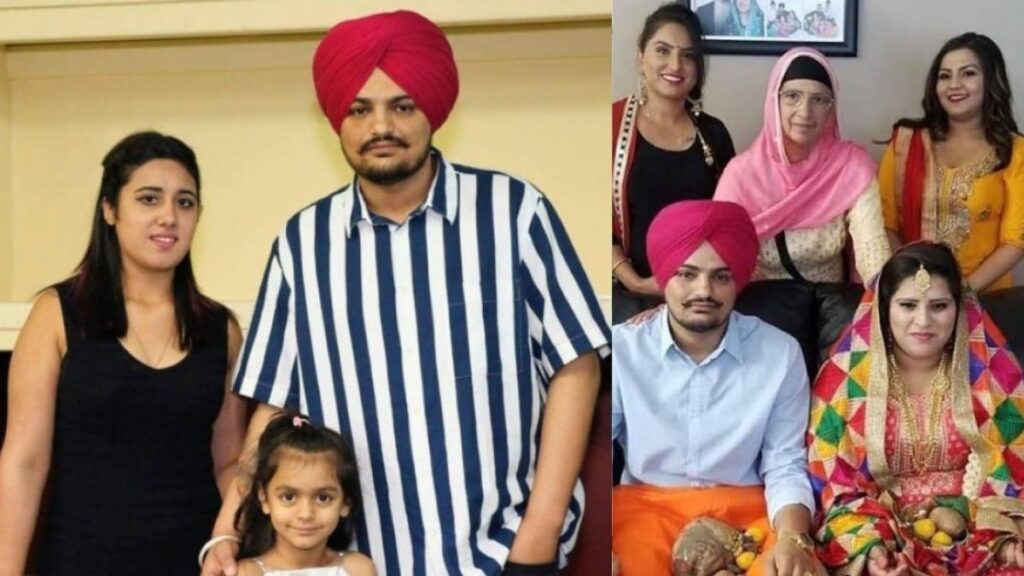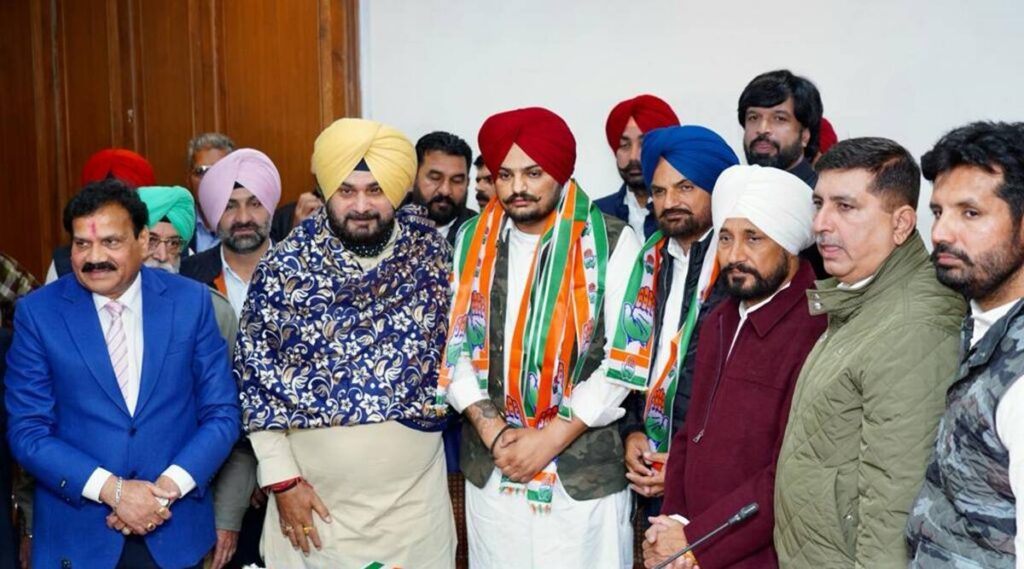
On May 29, 2023, the world commemorates the first anniversary of the untimely demise of Sidhu Moosewala, a beloved Punjabi singer and cultural icon. Tragically, Moosewala was fatally shot in his hometown by members of the Lawrence Bishnoi gang just a year ago. His passing continues to be mourned by all, including his fiancée, Amandeep Kaur.
Sidhu Moosewala was an influential Punjabi singer who reached the pinnacle of his career before his life was cut short due to a feud between rival gangs. The incident occurred in the Mansa district of Punjab, mere months after he had joined the Congress party and ventured into the realm of politics.

The sudden loss of Sidhu Moosewala profoundly devastated not only his parents and fans but also his fiancée, Amandeep Kaur. Moosewala and Kaur had recently become engaged and had plans to marry in November 2022.
Reportedly, Sidhu Moosewala and Amandeep Kaur had been in a romantic relationship for two years, as confirmed by the Punjabi singer’s mother following his tragic demise. Kaur, who hailed from Sangreri district in Punjab, had met Moosewala while residing in Canada, where she held permanent residency. Furthermore, she had also worked as Moosewala’s assistant for a brief period.
In the wake of Sidhu Moosewala’s passing, Amandeep Kaur was profoundly shaken and made a heartfelt decision never to enter into marriage again, as a testament to her everlasting love. She currently resides with Moosewala’s parents in his hometown of Mansa.
The circumstances surrounding Sidhu Moosewala’s death involved multiple assailants, and gangster Goldy Brar from the Lawrence Bishnoi gang later claimed responsibility for the tragedy. The loss of this influential artist continues to be mourned by countless individuals worldwide.
“Mera na mera na, har passe har thaan. Har galli har mod, lagge paye aa billboard. Feeling like I’m a God, tere Jatt da ni tod (It’s my name, it’s my name in every direction and place. There are billboards with my name on every corner and street. I feel like I am God and no one can compete with me).”
These are the lyrics of the final song by Sidhu Moose Wala, which was released posthumously on April 7 of this year, featuring Nigerian singer Burna Boy. The song beautifully encapsulates the worldwide fame achieved by the singer-rapper during his lifetime, with his devoted fans constantly uttering his name and his presence felt through billboards and murals.
Songs released after an artist’s passing often accumulate millions of views, and this track was no exception. It garnered a million views within a mere 15 minutes, a testament to Moose Wala’s enduring impact and legacy. Tragically, the singer-rapper was fatally shot in the Jawaharke village of Mansa district, Punjab, on May 29 of the previous year, a day after the Punjab government reduced his security cover, details of which were publicly disclosed.

Three songs by Moose Wala have been released posthumously. However, two of them, namely “SYL” and a track titled “Vaar” dedicated to Sikh warrior Hari Singh Nalwa, became embroiled in controversy. The song “SYL,” focusing on the river dispute between Punjab and Haryana, was banned on YouTube. Similarly, objections were raised by a section of the Muslim community regarding a reference to “Muhammad” in the track dedicated to Hari Singh Nalwa. Moose Wala was no stranger to controversy, as he himself acknowledged in his hit song “295,” where he addressed the creation of new controversies every day and debates in the name of religion.
The rise of Sidhu Moose Wala as an artist was nothing short of extraordinary. Born Shubhdeep Singh Sidhu in a farmer’s family from Moosa village in Mansa on June 11, 1993, he adopted the moniker Moose Wala, signifying his connection to his hometown, and proudly displayed his Jatt caste identity through his surname, Sidhu.
Moose Wala’s ascent to fame was meteoric, capturing the public’s imagination almost overnight with his song “So High,” released in 2017. Collaborating with music producer Byg Byrd, the lyrics “sirr utto langan fly kar ke, ucchiyaan neh gallan tere yaar diyan” became a sensational hit, resonating through car speakers and dance floors everywhere.
While “So High” was not Moose Wala’s debut song (that distinction belongs to “G Wagon,” a duet with Gurlez Akhtar produced by Deep Jandu), it was the song that propelled him to immense stardom, setting the stage for his unstoppable rise.
Following his passing, old videos of Moose Wala’s performances at college fests have amassed millions of views, leaving viewers astounded by the transformation of a seemingly modest and shy young man into a megastar. In one such video, from his appearance on the popular show “Canteeni Mandeer” years before his rise to fame, he introduced himself as Shubhdeep Sidhu, mentioning that his recent song “License” was sung by Ninja. He then showcased his singing talent, eliciting thunderous applause from the college audience.
No one could have predicted that Moose Wala would go on to redefine Punjabi music within a few short years. What set his songs apart from others was his ability to connect with fans through a blend of rustic Punjabi and colloquial English, forging a unique bond.
Moose Wala often found himself entangled in controversies over his song lyrics and accusations of glorifying gun culture and gangsters. However, those close to him assert that he was misunderstood, and his songs did not reflect the entirety of his character.
Sam Malhi, a Director of Photography who collaborated with music director Sukh Sanghera on seven of Moose Wala’s videos, including “US” and “GOAT,” fondly recalls their time together. Malhi describes Moose Wala as one of the most genuine individuals he ever met, devoid of any airs despite his stardom, and treating everyone with respect. The overwhelming global grief following his passing, according to Malhi, stemmed not only from people’s love for his songs but also their connection to his persona.
Moose Wala’s death is an irreplaceable loss for the Punjabi music industry. His ability to elevate Punjabi music to international platforms was unparalleled, as evident from his collaborations with UK artists like Tion Wayne and Stefflon Don. Burna Boy even visited his village to shoot the music video for their song. Moose Wala’s genius was recognized by international artists, and his absence leaves an unfillable void.
Mandy Takhar, a British-born actress who worked with Moose Wala in his debut film “Yes I am Student” released in 2021, remembers him as a down-to-earth individual who cherished Punjab, music, and his parents above all else. During the shoot, he was soft-spoken and shy, but they gradually built a comfortable rapport.
Moose Wala had a unique way of responding to controversies through his songs. Following his defeat in the Punjab Vidhan Sabha elections, where he ran as a Congress party candidate and lost to AAP’s Vijay Singla, he released a song titled “Scapegoat.” In this song, he referred to those who did not vote for his party as traitors to the community, even mentioning the names of Bibi Khalra and Simranjit Singh Mann.
While fans grapple with his absence, there is no doubt that Moose Wala will continue to dominate the music scene through his unreleased songs, ensuring that his legacy endures for the foreseeable future.
Who is Sidhu Moosewala?
Sidhu Moosewala, whose real name is Shubhdeep Singh Sidhu, was a popular Punjabi singer and rapper. He rose to prominence in the Punjabi music industry with his unique style and powerful lyrics. Moosewala was known for blending rustic Punjabi and colloquial English in his songs, which resonated with a wide audience. He achieved immense fame and success during his career and became one of the leading artists in the Punjabi music scene.
When was Sidhu Moosewala born?
Sidhu Moosewala was born on June 11, 1993.
When did Sidhu Moosewala pass away?
Sidhu Moosewala passed away on May 29, 2022. He was shot dead in the Jawaharke village of Mansa district, Punjab, India.
What were some of Sidhu Moosewala’s popular songs?
Sidhu Moosewala had numerous popular songs throughout his career. Some of his notable tracks include “So High,” “Issa Jatt,” “Famous,” “Warning Shots,” “Legend,” “Dollar,” “East Side Flow,” “Old Skool,” and “47.”
Did Sidhu Moosewala face controversies during his career?
Yes, Sidhu Moosewala faced controversies during his career. Some of his songs sparked controversies due to their lyrics, with religious and political leaders objecting to certain references. Moosewala was accused of glorifying gun culture and gangsters in his songs. However, his fans and those close to him often asserted that he was misunderstood, and his songs did not reflect his entire personality.
Did Sidhu Moosewala collaborate with international artists?
Yes, Sidhu Moosewala collaborated with international artists. He collaborated with artists like Burna Boy from Nigeria, Tion Wayne and Stefflon Don from the United Kingdom, and others. These collaborations showcased his global appeal and helped him reach a wider audience.
What is Sidhu Moosewala’s legacy?
Sidhu Moosewala left a significant impact on the Punjabi music industry. His unique style, powerful lyrics, and ability to connect with his audience made him one of the most influential artists of his time. Moosewala’s songs continue to be loved and listened to by fans even after his passing, and his legacy as a talented and innovative artist lives on.





